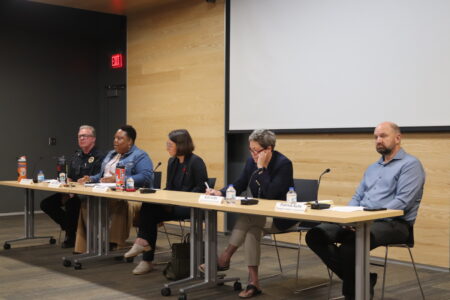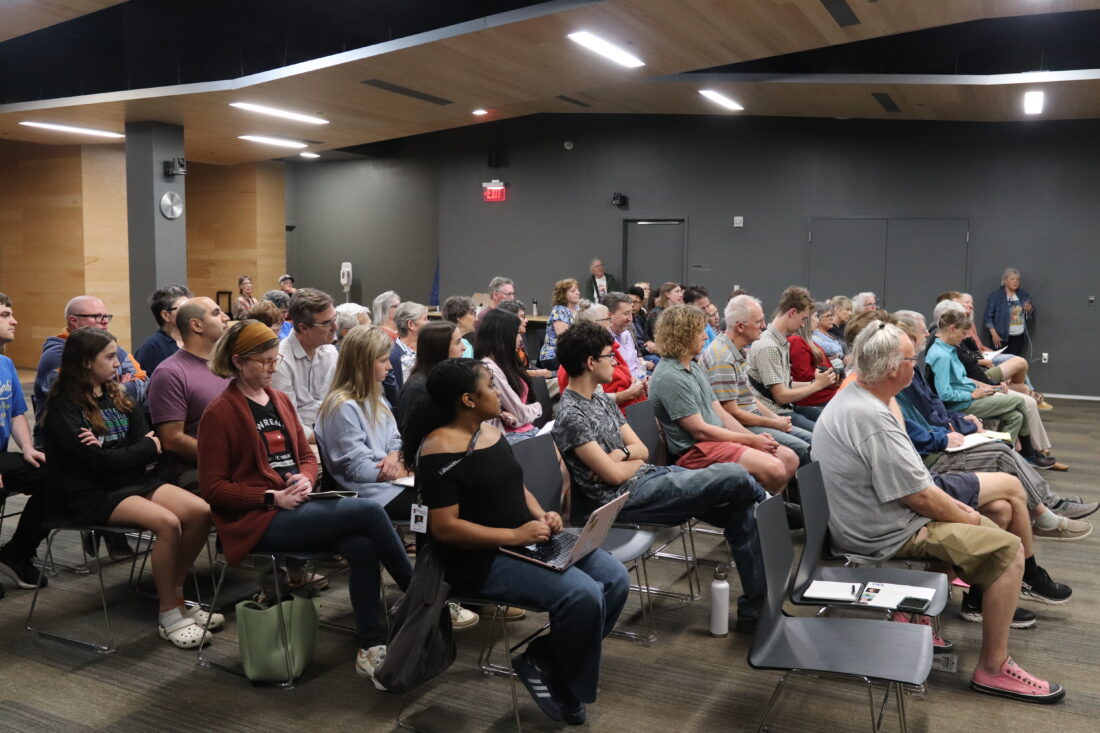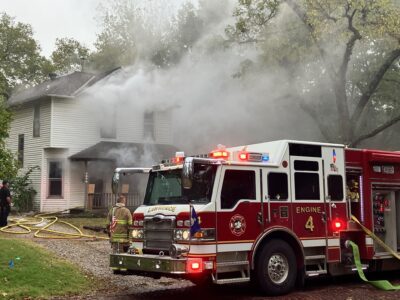Panel with Lawrence officials explore how to restore civility in public conversations

photo by: Josie Heimsoth/Journal-World
Lawrence Police Chief Rich Lockhart, City Commissioner Amber Sellers, Lawrence school board member Kelly Jones, KU law professor Kyle Velte and County Commissioner Patrick Kelly discuss civility in civic discourse at a panel on Monday, Oct. 6, 2025, at the Lawrence Public Library.
In response to rising hostility at public meetings and threats against local leaders, a panel of Lawrence officials and community members gathered to urge a return to civility in civic discourse.
A panel discussion titled “Bringing Civility Back to Civic Discourse,” was sponsored by the League of Women Voters of Lawrence-Douglas County . It was held at the Lawrence Public Library on Monday with Lawrence Police Chief Rich Lockhart, Lawrence City Commissioner Amber Sellers, Lawrence school board past president Kelly Jones, Douglas County Commissioner Patrick Kelly and KU law professor Kyle Velte.
Sonja Czarnecki, co-vice president of League of Women Voters of Lawrence-Douglas County, said the idea for the event floated around following the recent presidential election in 2024, the “ongoing political violence at the national level, (the) alarming levels of aggression in public meetings and the communication with elected officials have unfortunately made this topic more timely than ever,” she said.
While nothing in state law requires that government bodies take public comment, it is a practice and tradition that public officials generally promote and value during regular business meetings. However, Lockhart, Sellers, Jones and Kelly have all been the focus of criticism from some public commenters at government meetings.
These commenters have often resorted to vulgar name-calling and disruptive conduct, leading most governing bodies in Lawrence to revise their procedures — shifting the public comment period to the end of meetings and, in some cases, prohibiting certain individuals from speaking in person.
Sellers responded to ongoing personal attacks last year by stepping away from the general public comment period during City Commission meetings for at least two months. In a statement posted to social media in early September 2024, Sellers explained her decision, citing repeated abusive personal attacks and what she described as a toxic environment that undermined public trust in democratic institutions. As a result, she chose to observe the comment period remotely.
Earlier this year, Jones raised similar concerns about the atmosphere surrounding public comment. Following a 30-minute standoff with a commenter who refused to follow board rules, Jones floated the idea of temporarily suspending public comment, as the Journal-World reported.
In another instance, last spring, one commenter was arrested on suspicion of “interfering with the conduct of public business” after repeatedly insulting Kelly with sexually graphic language at meetings and arguing with the commission chair.

photo by: Josie Heimsoth/Journal-World
People gathered for a panel at the Lawrence Public Library about civility in civil discourse with Lawrence leaders.
Jones said there were no police officers in the meeting room eight years ago when she first started on the school board, but now, she would not run a board meeting without a police officer in the room.
“Because I am concerned about the safety of individuals in that space,” Jones said. “So there has been a very serious shift. And our current superintendent, Dr. (Jeanice) Swift … there’s something I learned from her. Very quickly, she said to me, … ‘You’re trying to create a space that’s safe for children. This is an extension of our classroom, like are you behaving in a way that you would behave in front of a five year old?'”
Lockhart said the best way to promote civic discourse in the community is to model good behavior as leaders. He said the International Association of Chiefs of Police recently released a resolution saying the disturbing rise in rhetoric from political and community leaders has contributed to active violence against law enforcement officers, elected officials and members of the public.
“When public figures or other influential individuals spread hate words, words have consequences, and in the wrong hands, they can become weapons,” Lockhart read from the resolution. He added that the idea is that public leaders influence a lot more people than they realize, and people can speak out in ways that aren’t recognizing someone else’s humanity.
Jones said there have been occasions where someone has taken something she has said in a board meeting and commodified it where it is something that is posted in a YouTube video with their own comments about it.
“And we want to be able to make comments about what our leaders are doing,” Jones said. ” … (But) now I have people all over the country … making threats because they feel that my actions are impeding their free speech or that I am not an advocate for free speech.”
Jones added that she has received threats of violence from this, saying, “I should be cut open or I should be assaulted in some way or another,” she said, saying these are challenging things to hear and this is a common occurrence.
Lockhart said social media algorithms are designed to suck people in. The algorithm picks up on what people are liking and forwarding and sends more of that content, and in some instances, it can surround people with hate speech.
“You just get looped and looped and looped again going back to people who maybe aren’t emotionally stable, and now they’re sending emails, and all the emails that Kelly gets and Patrick gets and Amber gets, I get, but I also get their email because now we’ve going to start looking at, is there a crime that’s taken place?”
Sellers said that it can be hard to hope for the best to come out of spaces like public comment because there are some people who would rather choose violence and discomfort.
“I get the microaggressions, I get the gaslighting, I get all the things,” Sellers said. ” … I think folks go to these (online) spaces to say the things that maybe they wouldn’t say with their full chest in front of me, or they wouldn’t say if they knew that it came with a fine, a fee or jail time.”
Kelly said so often, people avoid conversations with people who maybe disagree with them on some level because it’s uncomfortable, but he feels like it’s his responsibility to stay engaged.
“I think we’re all looking for a way for it to be easier and more comfortable, but we’re only going to make progress if we’re in that zone where we can actually challenge our own thinking and our own ideas and expect that of others too,” Kelly said.
Sellers added that there have also been instances where individuals giving public comments have spoken about their position on an issue and interpret it as if everyone else feels the same way.
“They’re coming at it from their perspective, where they sit in the middle of that, so it’s very person-centered, which is fine, but you can’t person-center a community issue,” Sellers said. ” … You don’t speak for an entire community.”
Velte said there are many different types of communities — such as those engaged with the school board, the state legislature, or a place of worship. Velte noted that what people say can have a direct impact on specific communities, sometimes in ways we don’t immediately recognize.
“Impact vs. intent is a big thing that we stress,” Velte said. “You might intend to say something that is what you think is kind of a position you want to take on a controversial issue, and free speech rights is allowing you to do that, but also think about the impact it might have on a listener or other members of the community.”
Sellers said she instead wants to encourage people to go out into their community and learn from all sides of an issue.
“As much as it’s my job and my duty and my sworn oath to represent individuals in this community, it should be just as much as your commitment to me as an elected official to do that same work,” Sellers said.





